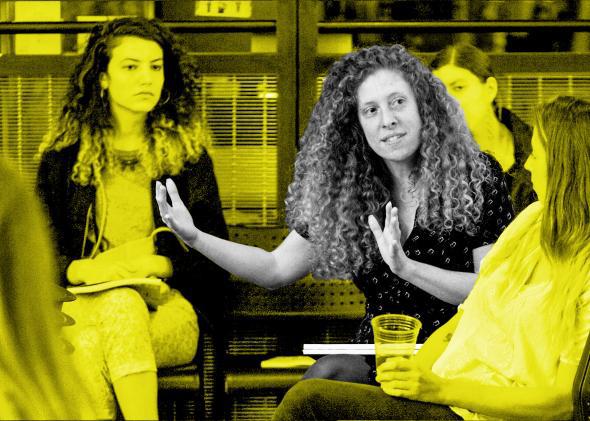Listen to this episode of Working using the player below:
Subscribe in iTunes ∙ RSS feed ∙ Download ∙ Play in a New Tab
This season on Working, we’re speaking to individuals employed in fields potentially imperiled by the Trump presidency. These are the stories of people doing difficult but important jobs—jobs that may get much more difficult and much more important in the years ahead.
For our latest episode, we spoke to Laurie Allen, a librarian at the University of Pennsylvania. The profession was a calling for her, she says, partly because when she was young she thought of it as “a way that really brilliant people could bring me their ideas and I could learn just enough about them to help,” without having to write the papers herself. “As a librarian,” she says, “my expertise is in the way [knowledge] is organized,” which is to say she’s still focused as much on where we should start in the quest to know more as with where we end up.
These days, Allen describes herself as a digital scholarship librarian, a specialty that involves “collaborating with faculty and students in the creation of scholarship in new forms.” That entails recognizing that books—important as they remain—aren’t the be all and end all of what a library can provide to its users. “Increasingly, in the digital world, a work of scholarship might be an interface, it might be a data set, it might be a work flow,” she says.
That wasn’t always her field, though. Initially, her training led her to the reference desk where she helped direct patrons to whatever information their research demanded. Though many of those she assisted were weaned on Google, she claims that they still recognize the importance of more personal assistance. “At least in my experience … I don’t know anyone who feels like they can comfortably find all the right information right now,” she says. Ensuring that they consistently can do just that, however, means that the profession—and the needs of its clientele—have evolved so rapidly during her 15-odd years in it that she claims she sometimes experiences a degree of “change fatigue.”
In her shift to less immediately corporeal work, though, she’s turned to increasingly urgent endeavors. Libraries are, in her phrase, “the long-term home for sharing the collected knowledge of our society,” but as she puts it, “Saving and storing and creating long-term access to digital materials is a really complicated problem.” Even in the best of times, bit rot—the tendency of data to degrade—is an active concern, easily as pressing for many as the effort to protect ancient manuscripts, even as it takes lessons from those projects. But the Trump administration has brought a new complication to such undertakings, not least of all because activists and scholars of all stripes are concerned that it will attempt to censor climate and environmental data, data that has long been publicly accessible.
That danger led Allen to the Data Refuge, an attempt to download such materials and give them a more permanent, stable home. “The goal of Data Refuge is to create safe copies of climate and environmental data that’s currently housed on federal websites,” she explains. “To make sure that those data remain available to communities as trustworthy copies and that we don’t lose those facts.” Ultimately, she and her compatriots hope to expand the effort, pulling in other information that might prove inconvenient for the new administration as it pursues its agenda.
These efforts are unfolding in concert with other attempts to preserve the internet, the shape of which is far more fragile than most realize. “The fact that government websites disappear and that’s just a thing that happens, I think we haven’t really attended to how weird that is,” she says. Aware of this strange truth, and opposed to it, Allen and others like her are working in concert with organizations such as the Internet Archive, some of whom have been involved in these projects well before Trump’s rise.
It’s here that Allen’s work in librarianship comes into play. When Data Refuge extracts materials from sites, it doesn’t always arrive in a form that’s immediately usable to those who might need it. But once it’s available in a readable form, it’s still important to make sure that it’s properly preserved and that it will remain so for anyone who seeks it out down the line. Employing a protocol developed by the Library of Congress, librarians such as Allen work to do just that and then give it a home where people will be able to find it.
Pressing as it is today, protecting this data is of a piece with what Allen and other librarians have always done as they strive to ensure that the people they serve can, she says, “own their information.” To help us better understand how she approaches these issues, then, Allen led us through the practical work of librarianship. Over the course of this episode, she discusses everything from meeting dynamics, to the racial and gender politics of the profession, to the values she shares with her colleagues. “The only bad thing is we’re all so self-righteous,” she says, approvingly.
Then in a Slate Plus extra, Allen tells us about another project she’s involved in, one that draws on data drawn from Philadelphia’s Schuylkill River. If you’re a member, enjoy bonus segments and interview transcripts from Working, plus other great podcast exclusives. You’ll also help Slate hold Donald Trump accountable in our podcasts and on the site as a whole. Start your two-week free trial at slate.com/workingplus.
Email: working@slate.com
Twitter: @Jacob_Brogan
